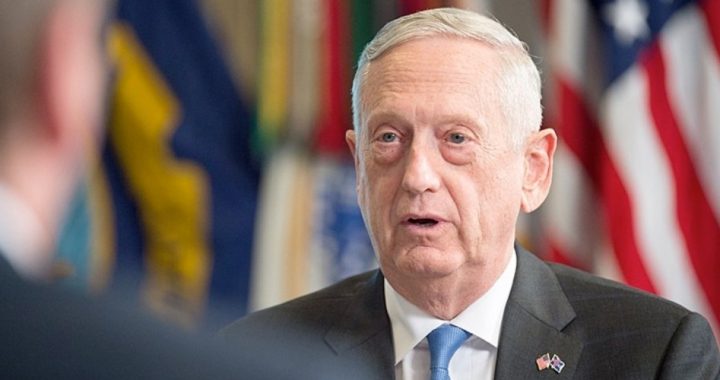
President Trump’s unexpected decision this week to pull U.S. troops out of Syria led almost immediately to the resignation of Secretary of Defense Jim “Mad Dog” Mattis on Thursday. While criticism from Democrats was a given, just for the sake of criticizing anything Trump does, the outrage of Republican internationalists over Mattis’ resignation revealed just how entrenched certain ideas are in the U.S. government — that America should be the world’s policeman being first among them.
Despite his tough image, complete with the moniker “Mad Dog,” it should be understood that Jim Mattis is no conservative, much less a constitutionalist. Mattis is the typical high-ranking military officer who made his way to the top by being politically correct. He was no Douglas MacArthur or George Patton, that’s for sure.
In testifying to the House Intelligence Committee in 2014, Mattis established his neoconservative credentials when he remarked about the “civil war” in Syria, “The geography of the globalized world does not permit us to look away as if this is not our problem.”
Mattis has been on the board of directors for the Center for a New American Security, a group that has called for the overthrow of Philippine President Rodrigo Duterte. According to Gideon Rose in the latest edition of Foreign Affairs, the official publication of the globalist Council on Foreign Relations (CFR), “regime change” in nations that “could not be trusted to participate in [the] collective security system” has been a principle for those supportive of the New World Order from the days of one of its principle advocates, Woodrow Wilson. Among the donors of the Center for a New American Security is George Soros’ Open Society Foundation.
Other members of the board include Denis Bovin, a high-ranking member of the CFR; Lewis Kaden, a member of the CFR and the Trilateral Commission, and the group’s CEO, Michèle Flournoy, a CFR member who was under-secretary of defense for President Barack Obama.
According to archived material of the U.S. Department of Defense, before Mattis traveled to the United Kingdom in March 2017, he first went to New York, where he consulted with the Council on Foreign Relations.
The decision to withdraw from Syria was not Trump’s first policy that Mattis opposed. He opposed Trump exiting the Iran nuclear deal, and he was critical of budget cuts that inhibited the ability to monitor the impact of global climate change. Mattis said, “Climate change is a challenge that requires a broader, whole-of-government response.” It is difficult to imagine those words coming out of the mouth of Patton or MacArthur.
No wonder that President Obama nominated Mattis in 2010 to replace David Petraeus as the head of U.S. Central Command.
It is not surprising that the Washington establishment loves Mattis.
Many Republicans, who share the idea that the United States should deploy troops around the world, were quick to react negatively to the news of Mattis’ departure and Trump’s decision to leave Syria. Senator-elect Mitt Romney (R-Utah) summed up the neoconservative position: “The foreign policy described by Gen. Mattis today has, for nearly ¾ of a century, kept us from global war, empowered our economy, helped billions escape from poverty and opened freedom’s door around the world,” the 2012 nominee of the Republican Party for president tweeted. “His service, vision and character were a blessing. He will be greatly missed.”
Senator Marco Rubio (R-Fla.) tweeted similar sentiments. “Just read Gen. Mattis’ resignation letter. It makes it abundantly clear that we are headed toward a series of grave policy errors which will endanger our nation, damage our alliances and empower our adversaries.”
In that letter, Mattis did not directly address the decision to pull out of Syria, but he did say that it was his “core belief” that American strength is “inextricably linked” to its multiple alliances with other countries. “That is why we must use all the tools of American power to provide for the common defense.”
Mattis told Trump, in the letter, “You have the right to have a secretary of defense whose views are better aligned with yours.”
That statement is certainly true, but from the response of several Senate Republicans, it is uncertain whether the Senate would confirm anyone as secretary of defense whose views actually did “better align” with Trump’s “American First” belief.
It is not doubted that there are many in and out of Congress who sincerely believe the deployment of American military forces all around the world is putting America First, but the entanglement of America in multiple alliances certainly advances the globalist agenda of the CFR and those who think like them — including political generals the likes of Jim Mattis.
Image: flickr



